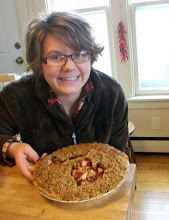



Today we arrived back from a three day trip to Cape Coast, just west of Accra. We left on Friday following a presentation from the USAID at the U.S. Embassy here in Accra. The presentation was an informational presentation of the health and sanitation issues that USAID and other charitable organizations are working on around the country. USAID tries to tackle a broad range of issues including maternal and infant mortality rates, access to potable water, preventing and treating HIV/AIDS and providing protection from malaria to Ghanaians around the country. They have quite a few hefty goals to say the least. But at least it was a great presentation of some of the gender and health problems trying to be confronted through policy.
We spent the weekend at an extremely upscale hotel in Cape Coast called Coconut Groves. A lot of celebrities have spent time there such as Will Smith, yessss the Fresh Prince of Belair!,Denzel Washington and the Williams sisters to name a few. Although this time there was a bunch of women missionaries from the States, so we had to bear with that for three days. However, it was so beautiful and located directly on the Atlantic coast. There is so much fresh fish and seafood being caught on a daily basis; it’s Ghana’s largest fishing town. That being said, I ate 9 small lobsters in one day.
During our time in the Coast, we visited both Cape Coast castle and Elmina castle. These castles were the castles used to store slaves before they were exported to South America, North America and the Caribbean between starting in the 15th century. The slave trade continued for nearly 300 years, only ending in the mid-1800s, around 1853. It is estimated that nearly 10 million African slaves were exported through these castles: one of the largest human migration in history. That being said, we took two extensive tours of the castles; more specifically, we toured the dungeons and cells where the humans were contained: beaten, raped, starved and tortured for months to years at a time. I can’t describe in words what if felt like to be there, the dungeons were rancid. They reeked of 300 years worth of decaying flesh, bones, feces, vomit, menstrual blood and urine. In fact, samples of the dirt in the cells have been taken and have shown to contain traces of such. Most dungeons had no windows; a few had some peepholes. However, the colonizers were Christians. In one castle, there was a church that was set directly above a torture chamber. After the tours, it was hard to understand how the British, Dutch, Portuguese and even Africans legitimized the slave trade. But the slave trade was part of the broader economy; utilized human labor in order to increase crop production so that the economy was able to produce more goods and more wealth. But I cannot help but to ask myself: what is the price of a human life? There is a Ghanaian proverb that states: the human body is more beautiful than gold.
Yesterday, we packed and drove out to the Kakum National Forest, the newest and the most popular national rainforest in Ghana. Clearly, this is because they have a famous canopy walk that contains seven bridges that are 60 meters from the ground, nearly half a mile off the ground. You can see photos of our experience of the walk above. It was beautiful.
Today is the Independence Day. Ghana is celebrating 53 years of independence since Kwame Nkrumah declared indepdendence from the British colony, making Ghana the very first free and independent nation in Africa. Ghana is founded on two principles: freedom and justice. They use the black star to represent justice, freedom and the unity of black Africa. In addition, Ghana’s flag, three stripes of yellow, green and red signifies yellow for gold, green for agriculture and red for blood shed in the name of social justice. Because of the holiday, we’ll be starting out first day of work on Tuesday. Tomorrow we’ll be exploring our office location within the city. I am excited to get started on projects and to be furthering my research on grassroots resistance to water privatization.


after you get started on the research and projects can you detail them in here? i wanna know! :)
ReplyDelete